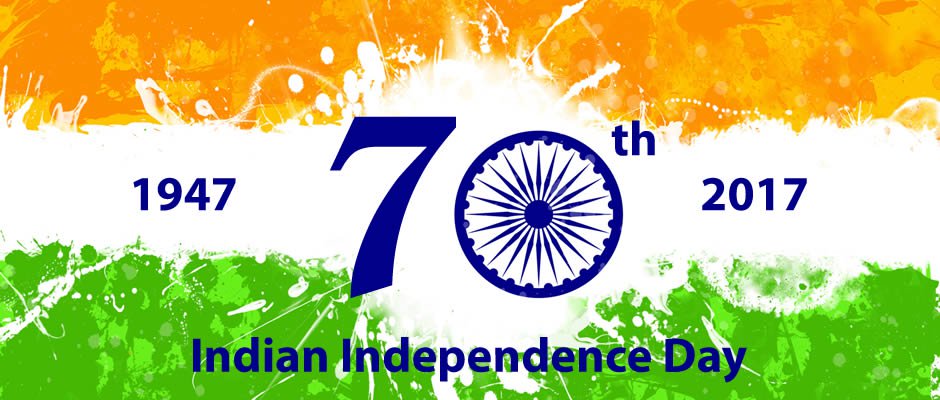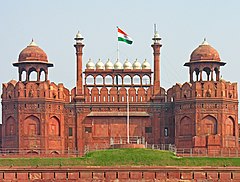INDEPENDENCE DAY OF INDIA
On 15 August 1947,
The UK Parliament passed the Indian Independence Act 1947 transferring legislative sovereignty to the Indian Constituent Assembly. India still retained King George VI as head of state until its transition to full republican constitution. India attained independence following the Independence Movement noted for largely nonviolent resistance and civil disobedience led by the Indian National Congress (INC). Independence coincided with the partition of India, in which the British India was divided along religious lines into the Dominions of India and Pakistan; the partition was accompanied by violent riots and mass casualties, and the displacement of nearly 15 million people due to religious violence. On 16 August 1947 (not 15th), Jawaharlal Nehru, who had become the first Prime Minister of India the day before, raised the Indian national flag above the Lahori Gate of the Red Fort in Delhi. On each subsequent Independence Day, the prime minister customarily raises the flag and gives an address to the nation.
The holiday is observed throughout India with flag-hoisting ceremonies, parades and cultural events. There is a national holiday, and schools and government offices distribute sweets, but no official work is done.
Why was August 15 chosen as Independence Day?
In 1929, when Jawaharlal Nehru as Congress President gave the call for ‘Poorna Swaraj’ or total independence from British colonial rule, January 26 was chosen as the Independence Day. In fact, Congress party continued to celebrate it 1930 on wards, till India attained independence and January 26, 1950 was chosen as the Republic Day – the day India formally became a sovereign country and was no longer a British Dominion.
So how did August 15 become India’s independence day? Well, Lord Mountbatten had been given a mandate by the British parliament to transfer the power by June 30, 1948. If he had waited till June 1948, in C Rajagopalachari’s memorable words, there would have been no power left to transfer. Mountbatten thus advanced the date to August 1947.
At that time, Mountbatten claimed that by advancing the date, he was ensuring that there will be no bloodshed or riot. He was, of course, to be proven wrong, although he later tried to justify is by saying that “wherever colonial rule has ended, there has been bloodshed. That is the price you pay.”
Based on Mountbatten’s inputs the Indian Independence Bill was introduced in the British House of Commons on July 4, 1947 and passed within a fortnight. It provided for the end of the British rule in India, on August 15, 1947, and the establishment of the Dominions of India and Pakistan, which were allowed to secede from the British Commonwealth.
Mountbatten later claimed, as quoted in Freedom at Midnight, that “The date I chose came out of the blue. I chose it in reply to a question. I was determined to show I was master of the whole event. When they asked had we set a date, I knew it had to be soon. I hadn’t worked it out exactly then — I thought it had to be about August or September and I then went out to the 15th August. Why? Because it was the second anniversary of Japan’s surrender.”
On August 15, 1945, Japanese Emperor Hirohito gave a recorded radio address, which later came to be known as the Jewel Voice Broadcast. In the radio address, he announced the surrender of Japan to the Allies. Mountbatten remembered hearing the news of Japanese surrender that day sitting in Churchill’s room, and as the Supreme Allied Commander of South East Asia Command signed the formal Japanese surrender of Singapore on September 4, 1945.
But how did Pakistan get independence on August 14? Actually it didn’t. The Indian Independence Bill gave August 15 as the date of independence for both the countries. The first stamp issued by Pakistan mentioned August 15 as its independence day. In his first address to Pakistan, Jinnah actually said, “August 15 is the birthday of the independent and sovereign state of Pakistan. It marks the fulfillment of the destiny of the Muslim nation which made great sacrifices in the past few years to have its homeland.”
In 1948, Pakistan started marking August 14 as its independence day, either because the ceremony for transfer of power in Karachi was held on August 14, 1947 or because August 14, 1947 was the 27th of Ramadan, a very sacred date to the Muslims.


















No comments: